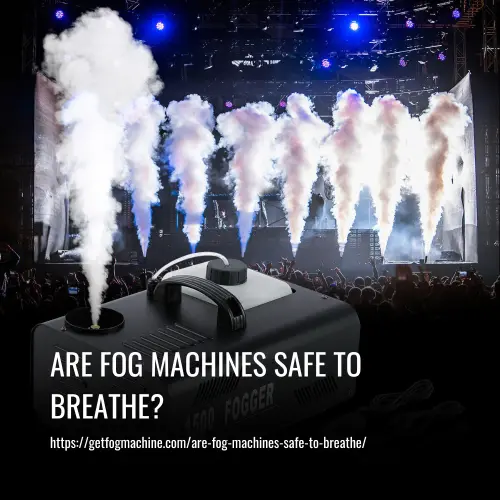Are Fog Machines Safe to Breathe?
This post contains affiliate links. As an Amazon Associate, we earn from qualifying purchases.
Fog machines are an essential tool for stage productions, parties, and events. However, there is a growing concern about the safety of breathing in the smoke produced by these machines. There are differing opinions regarding the safety of inhaling fog machines.
In this article, we will explore whether or not fog machines are safe to breathe in detail. We will discuss the potential health risks associated with inhaling fog machine smoke and provide recommendations on how to minimize those risks.

Are Fog Machines Safe to Breathe
Many people wonder if it’s safe to breathe in the fog produced by fog machines. The good news is that regular fog fluids used in these machines are not carcinogenic and do not cause immediate respiratory problems. Moreover, they do not remove oxygen from the surrounding area.
Although glycol, the only compound used with water, may cause throat and eye irritations following prolonged exposure, various studies suggest that it remains safe for general use. It’s only advised to avoid excessive use of fog around singers, especially opera singers as a precautionary measure.
What Happens If You Breathe in a Fog Machine
It’s important to be aware that the fog produced by fog machines can potentially cause some negative health effects if inhaled for an extended period of time. The American College of Allergy, Asthma and Immunology has noted that people who are repeatedly exposed to the fog may experience eye irritation, as well as throat and voice symptoms.
In some cases, individuals without asthma could exhibit bronchitis or asthmatic-like symptoms due to extreme exposure. It’s always best practice to limit your exposure to fog machines and ensure proper ventilation when using them in enclosed spaces.
Are the Fog Machine Side Effects Dangerous
The potential side effects of fog machines are a cause for concern, as prolonged exposure to glycol-based fog can lead to serious health issues. This is particularly true for individuals with pre-existing breathing problems, who may experience severe difficulties in breathing and resistance in the airway.
Even those without respiratory issues may still experience bronchitis-like symptoms after prolonged exposure to the fog emitted by these machines. Therefore, it is important to take precautions and limit exposure to these machines whenever possible.
What about Long-Term Exposure to Fog Machines
Long-term exposure to fog machines can cause both short-term and long-term side effects, which may impact people who work with them for extended periods. This includes those who operate the machines during events, and who may experience voice and upper airway symptoms.
It’s important to note that continued exposure over several years could exacerbate these issues. Therefore, it’s important to take appropriate safety measures when working with fog machines or being regularly exposed to their smoke.
What If You Need to Use Fog for Your Special Event
If you are planning to use a fog machine for your special event, it is important to take the necessary precautions to ensure the safety of everyone involved. It is recommended that you only use water-based glycerin mixes and limit usage to one or two times a day with breaks in between.
To avoid any breathing problems, it is essential to have proper air circulation in the area where the fog machine will be used. Inhaling high concentrations of chemicals from stagnant areas can cause respiratory issues over time.
Using appropriate filters can also help reduce chemical and particulate exposure. By following these safety measures, you can still create an exciting ambiance for your event while ensuring that everyone stays safe and healthy.

How Can You Be Safe from Exposure to Fog Machine Chemicals
When it comes to artificial fog, safety should be your top priority. To ensure that you stay safe and avoid health hazards, it is important to use less toxic liquids recommended by the manufacturer and approved by FDA. When using the fog machine, make sure to wear a face mask and avoid standing or sitting too close to the device.
If you plan on using the machine in an enclosed space such as a theater or concert hall, it is advisable to re-evaluate its use. Smoking near the device is also strongly discouraged. Keep children away from the area where artificial fog is being released as their smaller airways can restrict their breathing even more easily than adults with respiratory disorders.
Additionally, avoid prolonged inhalation of propylene glycol by not standing next to machines for extended periods during performances. Lastly, keep the fog outlets away from people and have a first aid kit and emergency plan just in case someone has a severe reaction to the fog.
By following these simple measures, you can significantly reduce any potential risks associated with using fog machines safely.
Warning Signs of Breathing Too Much Fog
It’s important to be aware of potential health effects when using fog machines. If you’re breathing in too much fog, you may experience certain symptoms such as wheezing, difficulty speaking, tightness in your chest, or coughing and gasping for air. These symptoms can be even worse if you have asthma or other respiratory conditions.
In addition to these breathing-related symptoms, some people may also experience headaches, dizziness, or nausea. If you do experience any of these warning signs while using a fog machine, it’s recommended that you stop use immediately and seek medical attention if the symptoms persist.
Do Fog Machines Affect Asthma
The potential risk of asthma from breathing in fog machine mist is still unclear based on current research. While studies have been conducted on e-cigarettes containing propylene glycol, which is also found in fog machines, it cannot be directly applied to the latter.
Research on Volatile Organic Compounds (VOCs), including propylene glycol, has not provided clear evidence of it causing or triggering asthma in healthy individuals or those with the condition.
A study involving toddlers and preschoolers exposed to PG in paints and solvents did show a conclusive effect on developing asthma, but more research is needed before drawing any conclusions about exposure through fog machines.
Personal experiences have not shown instances of asthma attacks triggered by fog machine use. However, individuals with asthma should take precautions and consult with their healthcare provider before being around any potential irritants.
What If Someone Has an Asthma Attack for a Fog Machine
Suppose someone experiences an asthma attack after being exposed to a fog machine, they should seek immediate medical attention and refrain from using the machine until their doctor can evaluate their condition.
As previously mentioned, inhaling fog machine vapors may lead to severe respiratory problems, making it crucial for individuals with asthma or any severe allergy to avoid exposure whenever possible. It’s important to prioritize one’s well-being and consult with a healthcare professional if experiencing symptoms related to fog machine use.
Are There Fog Machines That Won’t Cause Any Health Problems
While some fog machines use glycerin-based solutions that can potentially cause health problems, there are alternatives available. Liquid air-based fog machines are the safest option as they do not contain propylene glycol which reduces oxygen levels and can be harmful to inhale.
However, if you do decide to use a glycerin-based fog machine, precautions should be taken. It is recommended that a face mask is worn when near the machine and that you avoid extended exposure to the fog, especially during performances where prolonged inhalation may occur.
By following these guidelines, it is possible to enjoy the special effects of fog machines without risking your health.

What Fluids Should Be Avoided to Operate Safely
To operate a fog machine safely, it’s important to know which fluids to avoid. High density fog fluids are not recommended for regular fog machines as they may cause overheating or underheating of the fluid, leading to potential hazards.
Colorized fluids are also best avoided as they may not colorize the smoke and could have additional chemicals that could be harmful like e-cigarettes. It’s better to opt for white fluids with similar ingredients, preferably the one recommended by the manufacturer for optimal vaporization at safe temperatures.
By using caution when selecting which fluids to use and sticking with safe options, you can enjoy the ambiance of a fog machine without risking your health.
FAQs
Using a fog machine indoors is possible, but it may result in coating all surfaces in the household. It’s important to note that carpeting may attract and be negatively affected by fog.
Water-based fog machines that contain glycol may trigger acute asthma symptoms like coughing, wheezing, shortness of breath, and chest tightness in individuals with airway hyper-reactivity and asthma.
Exposure to glycol-based fog was associated with acute cough and dry throat. Increased fog aerosol overall led to increased acute upper airway symptoms. Individuals working closest to the fog source exhibited significantly lower lung function.
Glycol fog can cause coughing, dry throat, headaches, dizziness, drowsiness, and fatigue in the short term. Extended exposure to smoke and fog can lead to respiratory issues, including chest tightness and wheezing in both the short and long term.
Fog fluids contain an active ingredient and deionized water, such as propylene glycol, triethylene glycol, or glycerin. Make sure the fog machine you use matches the fluid’s vaporization temperature.
If the fog machine is causing coughing, it may be due to a malfunction or lower quality fluid. It is recommended that individuals with respiratory conditions or asthma avoid areas with heavy smoke or fog.
Individuals who may be more vulnerable, such as pregnant women, children, those with severe lung problems or asthma, and individuals with serious illnesses like AIDS, should avoid being exposed to smoke and fog.
The use of a theatrical fog machine poses a potential risk of lipoid pneumonia, which occurs when oil droplets from mineral oil-based fluid coat the lungs after inhalation.
Fog machines that mix water solution with glycol, glycerin, or mineral oil have the possibility to cause respiratory problems such as coughing, wheezing, chest tightness, and shortness of breath for people having allergies or asthma.
Our formulas are derived from water and have been tested and determined to be safe for contact with children, plants, and animals.
Conclusion
While fog machines may seem harmless and fun to play with, it’s important to remember that the fog they produce can be harmful if breathed in large amounts or for extended periods of time.
If you are planning on using a fog machine, make sure to take proper safety precautions such as using it in a well-ventilated area and avoiding prolonged exposure. By following these tips, you can safely enjoy the effects of a fog machine without any negative health consequences.






